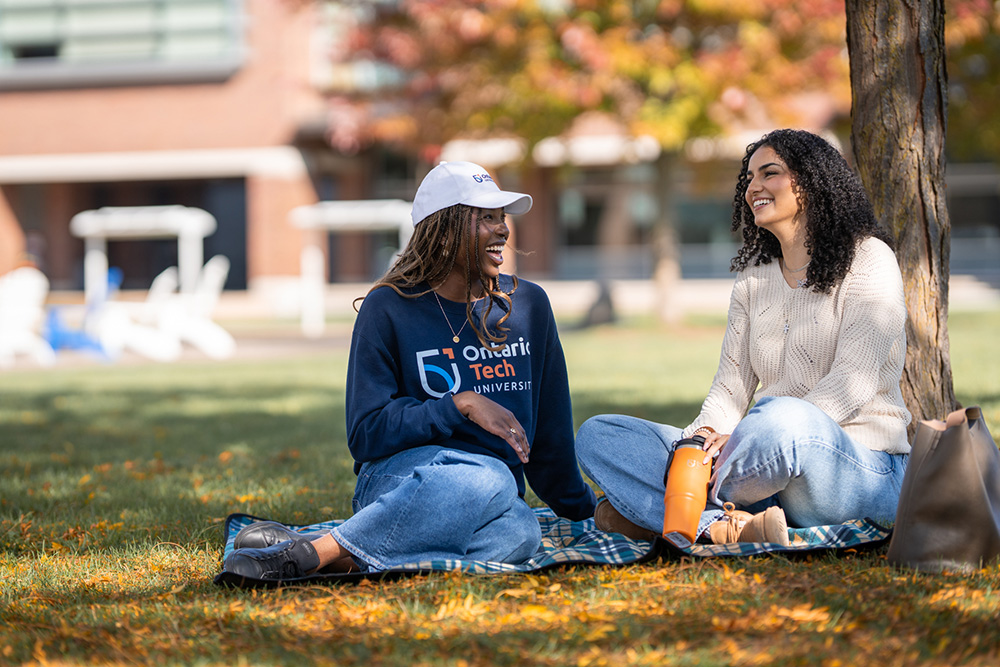CSI: UOIT - coming to campus this summer
March 22, 2007
Natural Sciences and Engineering Research Council of Canada grant will introduce high school students to the exciting world of forensic science
High school students from across the province are about to spend their summer lifting fingerprints and collecting crime scene evidence as the University of Ontario Institute of Technology (UOIT) Faculty of Science utilizes a $41,000 PromoScience grant from the Natural Sciences and Engineering Research Council of Canada (NSERC) to provide an in-depth and inside look at how science can be applied and utilized in forensic investigations.
The UOIT Crime Scene Science Camp will launch this summer, offering students in Grades 9 to 12 access to hands-on learning activities at UOIT's Crime Scene House and the university's state-of-the-art campus, and a chance to experience the stimulating, challenging and rewarding professions that come with careers in science.
PromoScience grants provide support for organizations that offer science and engineering opportunities to Canadian youth. UOIT will receive its funding over the next three years with camp co-ordinators Dr. Shari Forbes, an assistant professor, and Kimberly Nugent, a senior laboratory instructor, both with UOIT's Faculty of Science, anticipating the camp will develop a strong base that will enable it to continue over the years.
"We are very thankful to NSERC for the confidence it has shown in us by the award of this PromoScience grant," said Dr. Forbes. "UOIT's Crime Scene Science Camp will provide young students from across Ontario and beyond with a truly unique experience and the opportunity to learn specifics about forensic science beyond the CSI phenomenon that has emerged on television."
The Crime Scene Science Camp is a week in length and six sessions will be offered. Each day will begin in UOIT's Crime Scene House where participants will identify, collect and package evidence as they investigate a range of simulated crime scenes in a realistic environment. The house contains six rooms and a basement that are furnished to resemble a typical domestic household. During the academic year, it's used as a laboratory for UOIT's Forensic Science program.
"The camp will also help foster a love for science that will stay with our participants through their entire lives," added Dr. Forbes. "There are untold career possibilities for anyone with a passion for science and we want to introduce that reality to high school students as they embark on the critical step of choosing the course of their postsecondary education and pursuing their career aspirations."
Campers will also analyze evidence in UOIT's state-of-the-art forensic laboratory, which features the latest equipment used by police and forensic facilities, including instruments to conduct physical, biological and chemical analyses.
"The camp will put students right at the heart of authentic and detailed crime scenes giving them a hands-on and stimulating learning experience unlike any other," said Nugent. "By partnering with police and other appropriate agencies, UOIT's Crime Scene House has become a key learning tool for UOIT students, providing them with critical practical experience that will position them to excel upon graduation. Now, with the camp, even more young students will benefit from the real-world lessons it offers."
Among the topics to be covered are crime scene investigation, trace evidence collection, fingerprint identification and recovery, DNA and bloodspatter analysis, and footwear, tool and tire mark impressions. In addition, all participants will receive their own crime scene kits and laptops will be available for use throughout the week.
"Having unfettered access to the UOIT campus and our lab will further open participants' eyes to all the great possibilities and opportunities that come with pursuing a university education," said Dr. William Smith, dean of the Faculty of Science. "It will also showcase the incredible facilities and equipment we offer to UOIT students, including the Crime Scene House, the only resource of its kind on a Canadian university campus."
Dr. Forbes's background is in analytical chemistry and forensic science. She completed an undergraduate and postgraduate degree at the University of Technology Sydney, in Australia, before moving to the University of Western Australia where she completed her postdoctoral fellowship. In 2005, she accepted a position at UOIT.
Nugent received her Bachelor of Science and Master of Science from the University of Toronto. Her research has focused on the DNA-based identification of hallucinogenic mushrooms for legal purposes and the creation of an expressed-sequence tag library from the fungal plant pathogen Ustilago maydis. She joined UOIT's Faculty of Science in 2006.
The camps are being offered the weeks of July 9 to 13, 16 to 20, 23 to 27, July 30 to August 3, August 13 to 17, and August 20 to 24. Participants have the option of attending daily or staying on campus for the duration of the week.
Registration forms are available at www.science.uoit.ca/csscamp.
High school students from across the province are about to spend their summer lifting fingerprints and collecting crime scene evidence as the University of Ontario Institute of Technology (UOIT) Faculty of Science utilizes a $41,000 PromoScience grant from the Natural Sciences and Engineering Research Council of Canada (NSERC) to provide an in-depth and inside look at how science can be applied and utilized in forensic investigations.
The UOIT Crime Scene Science Camp will launch this summer, offering students in Grades 9 to 12 access to hands-on learning activities at UOIT's Crime Scene House and the university's state-of-the-art campus, and a chance to experience the stimulating, challenging and rewarding professions that come with careers in science.
PromoScience grants provide support for organizations that offer science and engineering opportunities to Canadian youth. UOIT will receive its funding over the next three years with camp co-ordinators Dr. Shari Forbes, an assistant professor, and Kimberly Nugent, a senior laboratory instructor, both with UOIT's Faculty of Science, anticipating the camp will develop a strong base that will enable it to continue over the years.
"We are very thankful to NSERC for the confidence it has shown in us by the award of this PromoScience grant," said Dr. Forbes. "UOIT's Crime Scene Science Camp will provide young students from across Ontario and beyond with a truly unique experience and the opportunity to learn specifics about forensic science beyond the CSI phenomenon that has emerged on television."
The Crime Scene Science Camp is a week in length and six sessions will be offered. Each day will begin in UOIT's Crime Scene House where participants will identify, collect and package evidence as they investigate a range of simulated crime scenes in a realistic environment. The house contains six rooms and a basement that are furnished to resemble a typical domestic household. During the academic year, it's used as a laboratory for UOIT's Forensic Science program.
"The camp will also help foster a love for science that will stay with our participants through their entire lives," added Dr. Forbes. "There are untold career possibilities for anyone with a passion for science and we want to introduce that reality to high school students as they embark on the critical step of choosing the course of their postsecondary education and pursuing their career aspirations."
Campers will also analyze evidence in UOIT's state-of-the-art forensic laboratory, which features the latest equipment used by police and forensic facilities, including instruments to conduct physical, biological and chemical analyses.
"The camp will put students right at the heart of authentic and detailed crime scenes giving them a hands-on and stimulating learning experience unlike any other," said Nugent. "By partnering with police and other appropriate agencies, UOIT's Crime Scene House has become a key learning tool for UOIT students, providing them with critical practical experience that will position them to excel upon graduation. Now, with the camp, even more young students will benefit from the real-world lessons it offers."
Among the topics to be covered are crime scene investigation, trace evidence collection, fingerprint identification and recovery, DNA and bloodspatter analysis, and footwear, tool and tire mark impressions. In addition, all participants will receive their own crime scene kits and laptops will be available for use throughout the week.
"Having unfettered access to the UOIT campus and our lab will further open participants' eyes to all the great possibilities and opportunities that come with pursuing a university education," said Dr. William Smith, dean of the Faculty of Science. "It will also showcase the incredible facilities and equipment we offer to UOIT students, including the Crime Scene House, the only resource of its kind on a Canadian university campus."
Dr. Forbes's background is in analytical chemistry and forensic science. She completed an undergraduate and postgraduate degree at the University of Technology Sydney, in Australia, before moving to the University of Western Australia where she completed her postdoctoral fellowship. In 2005, she accepted a position at UOIT.
Nugent received her Bachelor of Science and Master of Science from the University of Toronto. Her research has focused on the DNA-based identification of hallucinogenic mushrooms for legal purposes and the creation of an expressed-sequence tag library from the fungal plant pathogen Ustilago maydis. She joined UOIT's Faculty of Science in 2006.
The camps are being offered the weeks of July 9 to 13, 16 to 20, 23 to 27, July 30 to August 3, August 13 to 17, and August 20 to 24. Participants have the option of attending daily or staying on campus for the duration of the week.
Registration forms are available at www.science.uoit.ca/csscamp.
About Ontario Tech University
A modern, forward-thinking university, Ontario Tech advances the discovery and application of knowledge to accelerate economic growth, regional development and social innovation. We inspire and equip our students and our graduates to make a positive impact in a tech-focused world. For us, it’s not only about developing the next tech breakthrough. Understanding and integrating the social and ethical implications of technology differentiates us as university. Learn more at ontariotechu.ca.



